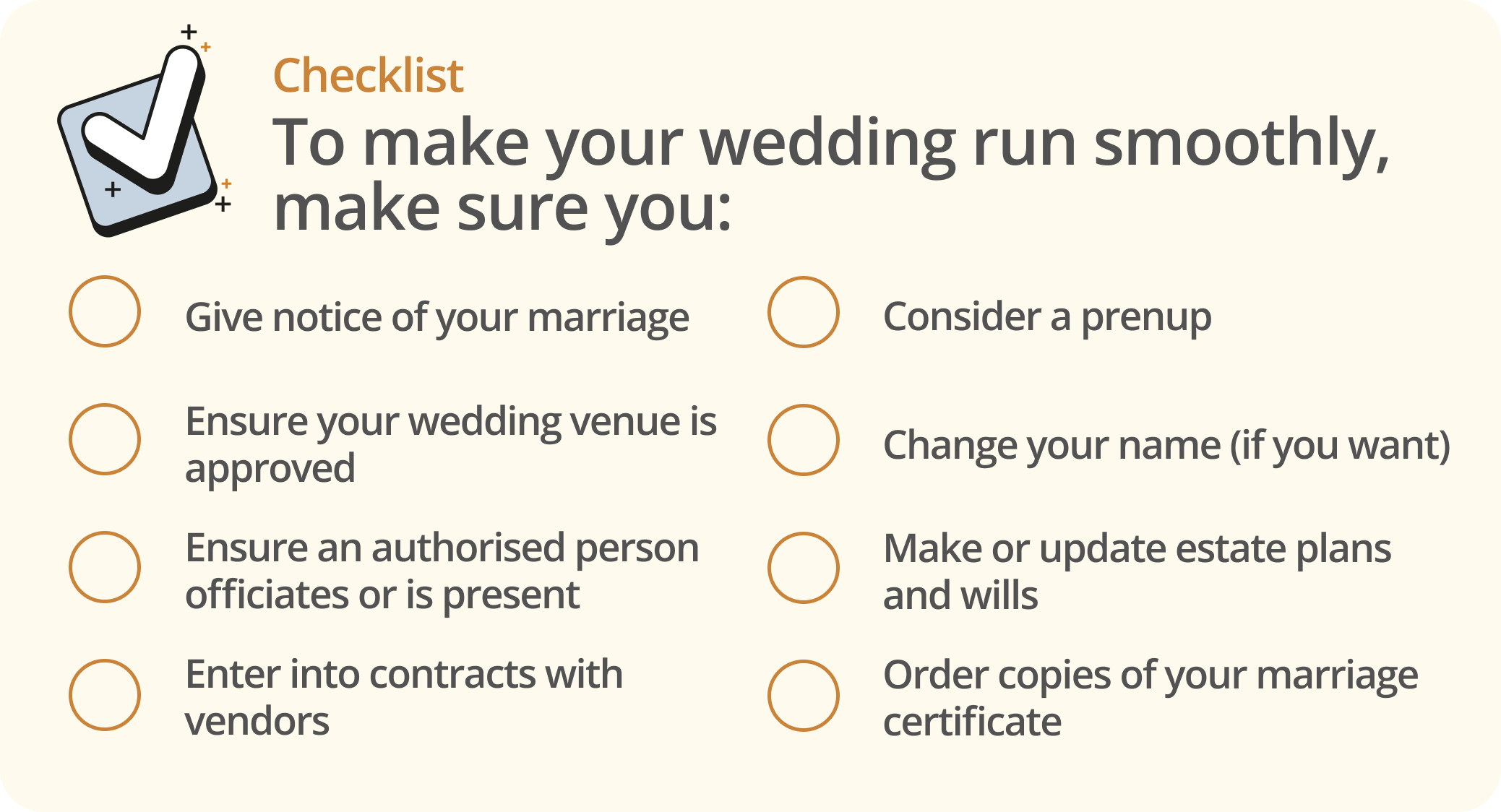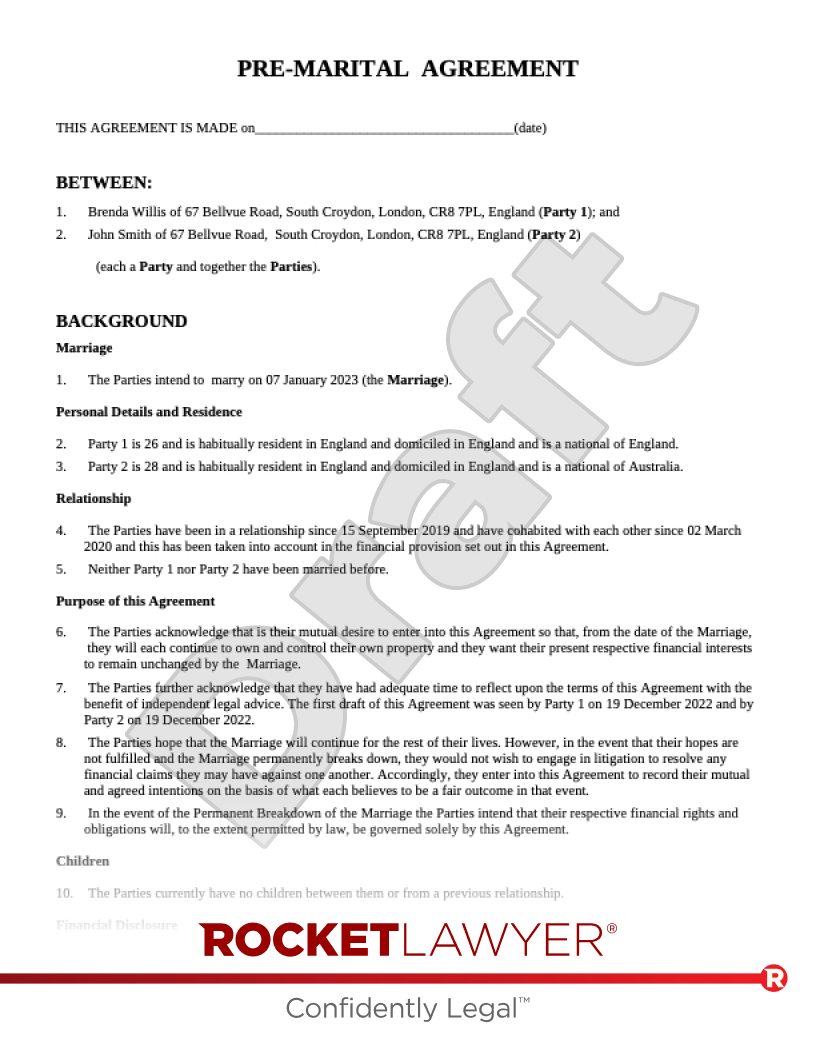Give notice of your marriage
To get married in England and Wales, you need to give notice of your intention to get married. You can give notice no later than four weeks before and not earlier than 12 months before your wedding ceremony.
You typically give notice at your local register office. Note that you must have lived in the local area for at least seven days before being able to give notice.
You can give notice together if you and your partner live in the same area. If you live in different areas, you must give notice separately to your local register offices.
Your marriage notice is then displayed publicly to give others a chance to object to the marriage (eg because one of you is already married and isn’t divorced). If no objections are received, your marriage document (also known as a ‘marriage schedule’ or ‘civil partnership schedule’) will be issued automatically.
Note that the process is slightly different if one of you is from outside the UK. For more information, read How to marry a foreign national or non-resident. Similarly, the process may vary if you marry in an Anglican wedding ceremony. For more information, read Getting married.
Ensure your wedding venue is approved to hold weddings
Civil (ie non-religious) ceremonies can be held in any register office or approved venue. Local councils across England and Wales continually approve venues, so there are various approved wedding venues to choose from. These include stately homes, hotels, refurbished barns, castles, and guild halls. You can find a list of approved venues in the government’s guidance on approved premises.
Religious ceremonies can be held at any registered religious building. This includes an Anglican church (ie Church of England or Church in Wales) and any other religious building, including a gurdwara, temple, or mosque, provided it is registered for marriage.
For more information, read Getting married.
Ensure an authorised person officiates or is present at your wedding
For a civil ceremony to be binding, a registrar must either officiate (ie carry out) or be present at your wedding ceremony. You can book a registrar yourself, or your venue may do this for you.
For a religious ceremony to be binding, an authorised person (eg a religious minister) must attend the ceremony and sign your marriage document. If your wedding venue doesn’t have an authorised person or that person isn’t available, you should book a registrar to attend and register the marriage instead.
The fees for booking a registrar vary depending on where you’re getting married.
For more information, read Getting married.
Enter into binding contracts with wedding vendors
Weddings tend to be big events that involve coordinating multiple vendors, as you’ll likely need to hire businesses to provide goods and services. For example, you may wish to:
-
book a wedding venue
-
engage a wedding planner to help you plan your wedding
-
hire a florist to provide your flowers
-
hire a decorator to decorate your wedding venue according to your wishes
-
hire a caterer to provide food
-
book a DJ or band to provide music at your reception
To ensure everything runs smoothly, planning the logistics in advance is essential. Vendors need details like when they can access the venue, when performances or catering should begin, and the timing for breaks. By addressing these questions early and putting agreements in writing, you minimise the risk of issues arising on the day. Similarly, entering into legally binding contracts ensures that you have a clear record of the terms you agreed to. This preparation lets you focus on celebrating with your spouse and loved ones.
Make sure to carefully review any contracts you receive from your vendors and consider getting a legal review of your contracts if you need clarification on any terms. While vendors will often provide their own contracts, you may wish to consider using the following Rocket Lawyer documents to help you plan your wedding if you are not happy with a vendor’s contracts or you're engaging a vendor who doesn’t have their own contracts (eg a musician just starting out):
-
an Engagement letter, to make a contract for any other services
If you have any legal questions or concerns, do not hesitate to Ask a lawyer.
Consider a prenup (or postnup)
While prenups and postnups aren’t the most romantic topics and may even seem pessimistic, they offer crucial protection for spouses in the event of a marital breakdown. These agreements encourage soon-to-be spouses to be open and honest about their financial situations.
When you get married, most of your belongings (known as ‘assets’) become ‘matrimonial property’. In the unfortunate event that your marriage breaks down and you get divorced, any matrimonial property can be divided between yourself and your soon-to-be ex-spouse.
Consider entering into a Prenuptial agreement (prenup) to protect your belongings and prevent them from being divided against your wishes if your relationship breaks down. This document is an agreement between you and your partner outlining how belongings will be divided in case of a divorce.
For more information on prenups, read How to make a prenuptial agreement and Considerations before getting married or forming a civil partnership.
Even if you decide not to enter into a prenup before getting married, you can always change your mind. If, once married, you would like to protect your individual assets, you can consider entering into a Postnuptial agreement (postnup). For more information, read Postnuptial agreements.
Prenups and postnups are essentially the same, with the difference being that prenups are entered into before a wedding while postnups are entered into after a wedding.
Use our Prenuptial and postnuptial agreement service to get independent legal advice on your prenup or postnup - obtaining advice is necessary if your agreement is to be considered by the courts in the event of divorce.
Change your name (if you want to)
The process for changing your name typically involves using a Statutory declaration of name change or deed poll. However, the process may be different if you want to change your surname after marrying, depending on the name change in question.
If you want to change your surname to your spouse’s surname or you want to double-barrel your name, the process is easier. Simply send your marriage certificate, along with a covering letter explaining that you wish to change your surname to your spouse’s surname/that you wish to adopt a double-barrelled surname to all organisations that need to update their records. This includes:
-
government bodies (like the Passport Office, HMRC, and your local council)
-
your landlord or mortgage provider
-
banks and building societies
-
your employer
-
your GP and dentist
-
any insurance providers, and
-
any other businesses or organisations you have accounts with (eg Netflix)
Remember that some official authorities, such as the Driver and Vehicle Licensing Agency (DVLA), will require an original marriage certificate. As a result, it’s advisable that you get several marriage certificates on or after your wedding day so that organisations can be notified of your name change quickly and conveniently.
If you want to adopt your spouse’s surname but want to keep your surname as a middle name, you will need to formally change your middle name. Similarly, if you (and/or your spouse) want to adopt a brand-new surname (either a combination of both your surnames or an entirely new surname), you will need to follow the formal process for changing your name. For more information, read Changing your name.
Make or update estate plans and wills
By marrying, your estate planning needs will likely change.
If you have just gotten married, or are about to get married, it is a good idea to update (or make) your Last will and testament. If you have never made a will, it's a good idea to make one when you marry. If you have previously made a will, you should review your decisions.
Note that your marriage may automatically invalidate most wills made before marriage, unless your will was made ‘in contemplation of marriage’ and truly reflects this. Making a will helps ensure that your wishes are respected in the event of your death, with your belongings passing to the intended recipients. For more information on wills, read Reasons to make a will and Making your will. Consider using our Will drafting service if you require a bespoke will.
However, estate planning goes beyond deciding who inherits your belongings; it also involves making arrangements for decisions during your lifetime, such as appointing someone to act on your behalf if you become incapacitated. By making a lasting power of attorney (LPA), you can appoint a trusted person (eg your spouse) to handle financial and welfare decisions if you cannot do so yourself. You can make your LPA using our Lasting power of attorney service.
For more information, read Estate planning.
Order copies of your marriage certificate
Your marriage certificate is the legal document that records your marriage. Marriage certificates will set out details relating to your wedding, including the date and place of your ceremony, and your and your spouse’s full names, ages, marital statuses, occupations and usual address(es).
After getting married, you won’t automatically be provided with a copy of your marriage certificate. Instead, you will need to order your marriage certificate from the local register office where the marriage was registered. It is a good idea to order more than one copy.
Let's get married!

Marriage marks the beginning of a new chapter, full of joy, excitement, and life changes. While your wedding day is a milestone to cherish, the legal and financial preparations you make will lay the foundation for a smooth transition into married life. By taking the time to organise everything from your wedding vendor contracts to your estate plans, you can ensure that your focus remains on the joy of the day—and the future you'll build together.
For more information, read Getting married, Registering a civil partnership, Considerations before getting married or forming a civil partnership, and Getting married in Scotland.
If you have any legal questions about getting married, including on how marriage may affect your legal rights, do not hesitate to Ask a lawyer.




